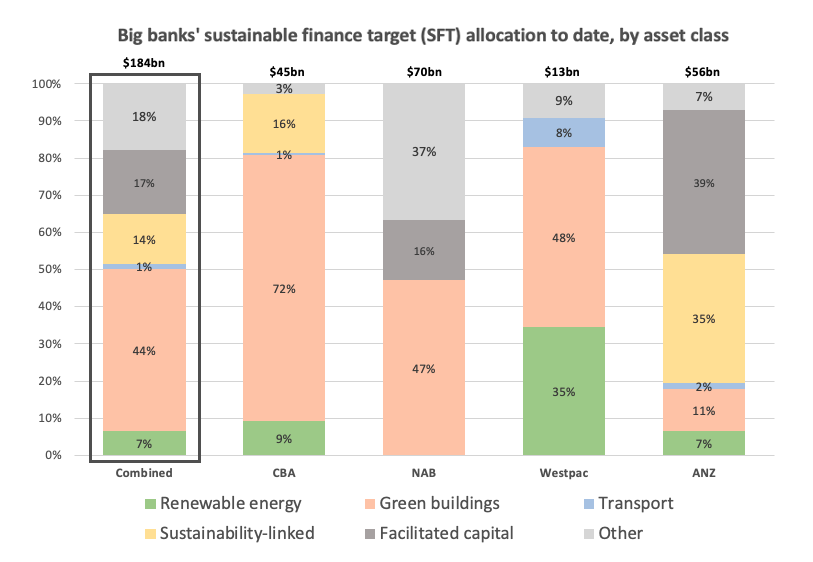
New analysis released today by independent think tank Climate Energy Finance reveals only 7%* of the Big 4 banks' collective $385bn sustainable finance target (SFT) by 2030 is directed to financing renewable energy and hard to abate industries, with the vast majority of their climate-related capital – between 44% and 72% – channelled into the low hanging fruit of business-as-usual ‘green buildings’ that meet minimum energy efficiency regulations.
This pivotal finding demonstrates that there is an enormous gap in banks’ financing of emissions reduction in key sectors including energy, transport and hard to abate industries. It puts Australia behind in the race to capture the massive investment, trade and employment opportunities of the net zero transformation.
Author of the analysis, CEF finance analyst Nishtha Aggarwal, said: “Our analysis shows the banks need to actively reorient their lending if they are to align their climate rhetoric with their capital flows.
“They must put ‘their’ money where their mouth is. Trumpeting climate action based on the low hanging fruit of financing minimally green-rated buildings is not enough, and leaves them open to accusation of greenwashing.
“The over-representation of fossil fuel interests on Australian banks’ boards is highly likely to undermine the credible pivot of climate finance. The banks should urgently remove the influence of these interests and recruit zero emissions expertise to drive credible net zero capital allocations to renewables and economy-wide decarbonisation.
“Australia’s sustainable finance taxonomy, due for release by the end of this year, while designed to provide more consistent definitions across asset classes captured within the banks’ SFTs, is unlikely to turn this bleak picture around at the speed and scale the climate science demands.
“The banks should be using their firepower to advocate for more ambitious and coordinated policy, regulatory and investment settings that reflect and enable our national climate and sustainable economic growth goals, demonstrating leadership in Australia’s economic transformation to a zero-carbon economy.”
CEF director Tim Buckley said: “Australia’s ability to achieve its national renewables and emissions reduction targets and secure its position in the rapidly emerging net zero world economy depends on its ability to mobilise capital at speed and scale towards the sectors that shift the dial the most. The Big 4 banks should be key drivers of this mobilisation”.
“Buildings are only truly green once they are fully electrified and thermally efficient, the grid is producing zero-emissions electricity, and building materials are decarbonised. That requires concerted action and investment to build firmed utility-scale renewable energy, and reduce emissions in hard-to-abate sectors like steel, cement, and aluminium.”
“The big banks must expand their commitment to and capabilities in executing long duration clean energy infrastructure deals, and rapidly increase their share of financing in future-facing sectors, such as value-added critical minerals key to global energy transition. This goes hand in hand with the imperative to commit to enabling a science aligned progressive fossil fuel phase-out across their financed emissions exposures.”
Key findings across the Big 4 banks:
- CBA’s current allocation under its $70bn SFT by 2030 boasts the worst renewable energy to green building financing ratio, investing nearly $8 into minimum regulatory-grade buildings for every dollar it invests in renewables.
- NAB’s major focus looks to have been a green property play comprising almost 50% of its $70bn SFT allocation to FY2022 with little transparency in other decarbonisation sectors. Given this, we were unable to discern the bank’s allocation to renewables, transport or hard to abate sectors. NAB needs to provide more transparency over where its new SFT is contributing to real world climate change mitigation.
- Westpac’s $15bn total committed exposure (TCE) target is by far the closest to getting the balance right, with a higher proportion of financing going towards renewable energy and low carbon transport than the other banks. From this year, its increased $55bn TCE target by 2030 will be underpinned by its new and impressive Sustainable Finance Framework that sets a higher than regulatory grade benchmark for green residential building criteria. This framework will be superseded by the national sustainable finance taxonomy once finalised by the end of the year.
- ANZ has committed the largest sum, a cumulative $150bn to sustainable finance this decade, but its contribution to real world outcomes is largely opaque with a combined 64% allocation towards instruments such as sustainability-linked and facilitative finance. The trouble with this is that capital could be facilitated or allocated to companies without credible decarbonisation pathways, and hence misaligned to the transition. This is a risk given ANZ’s client base, board composition and its continually high fossil fuel exposure whilst being the only big 4 bank without a substantive policy to restrict financing to new oil and gas.
*7% is the total share of renewables financing out of the $184bn combined banks’ SFT allocations to date. It is not an average of the banks’ individual renewables financing proportions.
##
Contact details:
Nishtha Aggarwal nishtha@climateenergyfinance.org / +61 412 321 946
Tim Buckley tim@climateenergyfinance.org / +61 408 102 127
Or via Annemarie Jonson annemarie@climateenergyfinance.org / +61 428 278 880

